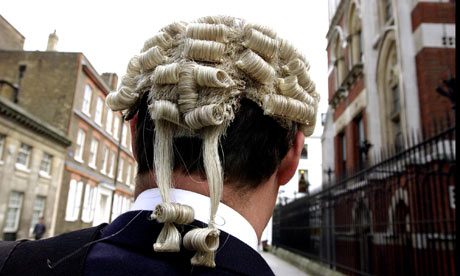
"How can you defend someone who you know is guilty?" This question is the bane of the criminal barrister's life. In every social situation, the moment I say what I do for a living, at least one person will spring it upon me, usually displaying a zeal born of the mistaken belief that they must be the first person to have ever thought of this supposed dilemma.
In Defending the Guilty, Alex McBride uses this question to frame what promises to be (according to the dust jacket) a hair-raising and hilarious account of the daily trials and tribulations in the life of a criminal barrister, while at the same time offering a genuine insight into the competing ethical issues and principles that lie at the heart of our criminal justice system. Sadly, it doesn't quite deliver on either promise.
Part memoir of McBride's early days at the criminal bar (coupled with attempts at Rumpolesque tales of derring-do in the courtroom), part beginner's guide to the legal system, part quasi-philosophical musings,the book feels as if it does not really know what it wants to be, nor its target audience. Moreover, it confusingly jumps around between topics and in time.
An explanation for this can probably be found in the fact that its origin lies in a column McBride writes for a magazine: a series of short, day-in-the-life anecdotes. A brief internet trawl revealed what I suspected as I was reading the book – that large parts of it were lifted from the column and reproduced almost word for word. McBride's attempt to impose an overarching structure on what is essentially a cobbled-together version of his columns feels superficial and much of the book has a "glued-on" feel.
This isn't to say that Defending the Guilty is boring. It rollicks along at a good pace and has its amusing moments. Some of the characters McBride represents are nicely described and he captures many of the highs and lows of being a trial advocate. I was particularly taken with the passages recounting what it is like being a trainee or "pupil" barrister. McBride and I qualified at around the same time and many of his experiences mirrored my own. With a good eye for a detail and a neat turn of phrase, he portrays the agonising experience of being on an extended period of probation, the constant sense of paranoia and insecurity, the desperate scramble for a "brief", followed by the anxiety of representing someone who thinks they are in the hands of a competent professional when you know you have no real idea of what you are doing and that they will be the guinea pig who suffers for your mistakes.
But as interesting as this trip down memory lane was for me, would it make a gripping read for anyone outside the profession? While there is a clear appetite for legal dramas among the public and an obvious human interest value in what we do, does anyone really want to know the abstruse mechanics of how a courtroom works or have explained to them the irritating "lingo" used by barristers? It doesn't help that McBride's humour is so puerile. Passages such as: "At the end of a trial, you want to look the prosecutor in the eyes and say, 'You thought you had a stone bonker of a case, did you, pal? Well I shoved it up your arse, cocksucker,'" are no substitute for real wit. And for all McBride's attempts at self-deprecation, one gets the feeling he is extremely pleased with himself.
Nor does he offer an adequately stimulating exposition of important legal issues. He has his moments (he is good on the irrationality of sentencing policy, which results in our country locking up more people than anywhere else in Europe, often with no discernible benefit in terms of deterrence or rehabilitation) but ultimately the question he poses for himself at the outset – "How do we ensure that the guilty are convicted and the innocent walk free?" – is answered only in basic terms.
He delivers little more than the standard lawyer's answer (valid though it is), which is the one I trot out to every persistent dinner-party guest, namely that in a democratic society everyone is entitled to a fair defence, someone is innocent until proven guilty and it must be for the jury, having heard the competing arguments, to decide.
He remains silent on the real issue presently at stake in the criminal justice system, namely the reforms in legal aid that are undermining the right of everyone to full representation by an independent barrister. It is a shame that an opportunity for provocative and considered thought has been vitiated by mediocre entertainment. Ultimately, the book possesses neither the flourish of the true raconteur nor the vigour of proper intellectual endeavour.

